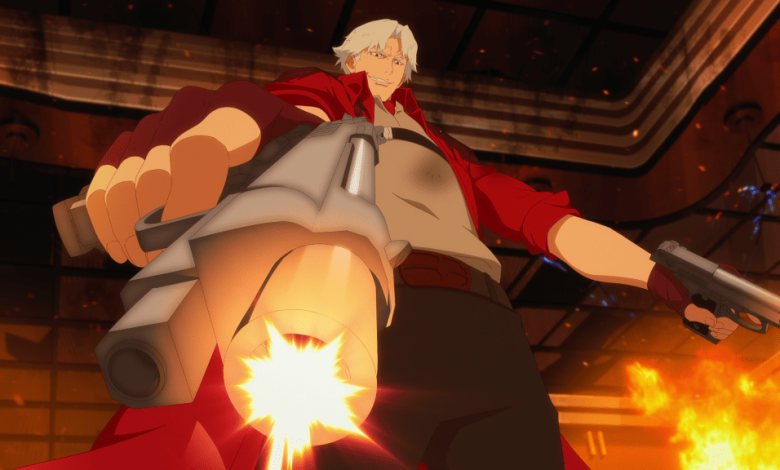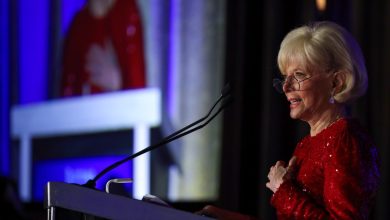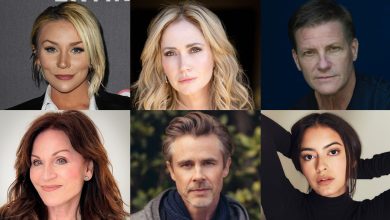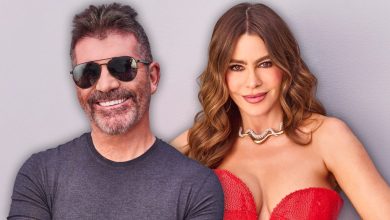Adi Shankar Reimagines Devil May Cry for Netflix with a New Continuity

For Adi Shankar, the chance to create an animated series based on Capcom’s Devil May Cry video game series was an amazing opportunity. As a super fan of the property himself, he wasted no time in writing the scripts and developing the series… even before Netflix signed on to create it. Now, with one season already finished and a second in the works, Shankar is working to build up a new universe based on one of his favorite properties.
Netflix’s Devil May Cry follows Dante (Johnny Yong Bosch), a young demon hunter who turns out to be the world’s best hope for salvation when a mysterious villain threatens to open the gates of Hell. Shankar says his focus in creating the series was not to remake or rehash the original story from the series, but to create a “new continuity” that still pays tribute to the essence of what made the games so special.
DEADLINE: How did you get started with turning Devil May Cry into a television series?
ADI SHANKAR: I had a wonderful meeting with Capcom. I’m a huge fan of their stuff – I mean, who isn’t, right? I grew up in Southeast Asia, so this was very much culturally in my DNA. So, we had this meeting with Capcom, and we’re talking about different IPs I can adapt, and when we talked about Devil May Cry, I was pumped. I got the rights from them, went off and developed the entirety of season one, all eight episodes. And then, I just kind of called up Netflix and said I’m ready to make this. They were like, great, let’s put it into development, but I said, “No, no, no. It’s already been developed. Here are the scripts and here’s a soundtrack list.” And they’re like, whoa, this is not how this works. But they read everything and they were blown away by it.
I think good storytelling is a process of excavation. You want to just keep excavating and finding more truth, and more nuance and add more layers to the piece. So, I came to them with a package of the rights, the entirety of season one, written and fully fleshed out with a soundtrack list.
DEADLINE: You say you’re a big fan of Capcom, how big of a fan are you of Devil May Cry specifically?
SHANKAR: Massive. I can nerd out about it for a long time, but I’m like a deep cut DMC fan. The fan base is, if you’re a fan of Devil May Cry, it’s a little crazy. You get really reactive. When DMC 4 came out, and there’s a new character named Nero who was introduced, I was really angry. I was like, ‘Why are they replacing Dante with Nero?’ And when the reboot came out, I was really upset.
DEADLINE: I’m a huge Capcom fan too, but the Devil May Cry game series is kind of a blind spot for me. When you were making the Netflix series, was there an impulse to follow the storylines you grew up with, or did you want to come up with a new story that still captured the same tone?
SHANKAR: I approached this as a new continuity. So, it’s not a remake, it’s not a rehash, but in some ways it’s closer to a retelling. And that’s the thing I do across all my stuff. If you watch even the short films on YouTube, it’s always like there’s the IP and then there’s the Adi Shankar spin on the IP. I wanted my show to feel like Devil May Cry, to take the spirit of DMC, but I thought of it as like Marvel’s Ultimate Universe, or even X-Men the animated series, like reinterpretations that preserve the emotional core while restructuring the mythology to suit a new medium. Essentially the foundation remains, but the scaffolding has been rebuilt to support long form storytelling in a serialized, animated format for streaming television.
See More ...
It’s a new universe, but it is one constructed from a complete obsessive understanding of canon, right? Both the public facing story and the deeper internal mythology that’s only known to Capcom, because you get access to all of that and just kind of absorb it even more. And you become even more of a super fan because you’ve gotten to peek behind the curtain. So, then my job as creator-showrunner is franchise architect for the DMC universe on Netflix. It’s to essentially take the full spectrum of knowledge and build something that respects the past while unlocking new narrative possibilities.
DEADLINE: As someone who was a fan since the beginning of Devil May Cry, what were some of those foundational elements that you needed to include?
SHANKAR: Well, there’s two ways I can answer this question. One is, this is as much a love letter to Devil May Cry as it is a love letter to Capcom. When I say it’s a love letter to Capcom, you’ve got this concept of Makai (the underworld) in my show, right? Makai exists in Devil May Cry, but Makai is also a connective thread across a lot of Capcom properties. You see it in Darkstalkers, Ghost ’n Goblins, you see it spiritually echoed in Onimusha… and if you zoom out even further, Makai is rooted in traditional Japanese mythology. It’s like a realm of chaos, inversion, suppressed threats, and so on and so forth.
So, it was balancing this larger love letter to Capcom with this visceral, over-the-top, stylish action that is the Devil May Cry brand at the end of the day, and then taking some more elements as well. For instance, music is a big part of the games, so music has to be a big part of my show, but I’m just going to do it differently. It’s going to be my spin on the music, but the music will still be a big part of the show. So, it was really deconstructing the DNA of the brand, and the DNA of Capcom, and then cross-pollinating all these elements and reverse engineering them into this Hollywood blockbuster. But then, subverting expectations by making you deeply care about this antagonist because, at the end of the day, Season 1 is an exploration of how we are all just children trying to reclaim what we lost as kids.




